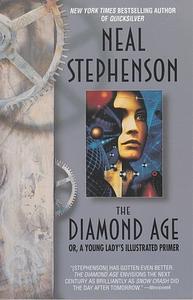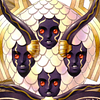Take a photo of a barcode or cover
One of Stephenson's weaker books, it really shows how much trouble he has crafting satisfying endings. This book is almost Dickensian in its reliance on coincidence to keep the story moving, almost certainly intentionally.
The Diamond Age does for nanotechnology what Snow Crash did for virtual reality. This is nerd-core writing at its best, at least for the first two thirds of the book. The ideas get too confused however and Stephenson spends too much time showing off his knowledge of nerd history, with entire sections of the book devoted to analogies of Turing's universal state machine (something I studied in a subject called The Theoretical Basis of Computer Science back in the 1980s - CS102 for those who went to UQ). Yes it's fascinating and his extrapolations on the nano-tech distopic potential - toner wars being one of my favourite concepts - are at times breathtaking, but ultimately the book bogs down and it gets hard to finish.
That said this is still a fabulous book and did more to popularise nanotechnology at a time when K Eric Drexler's science books on nanotech were yet to be published.
That said this is still a fabulous book and did more to popularise nanotechnology at a time when K Eric Drexler's science books on nanotech were yet to be published.
I loved this book! Great world-building and Nell is a fantastic character. However, the ending felt a little flat and abrupt to me. Still a fantastic coming-of-age story in a world relying on nanotechnology.
challenging
slow-paced
Plot or Character Driven:
A mix
Strong character development:
Yes
Loveable characters:
Complicated
Diverse cast of characters:
Complicated
Flaws of characters a main focus:
Yes
Finished reading this great mess of a book. The first act is a nearly plot-free wall of exposition that I only stuck with because I've enjoyed other Neal Stephenson before. The second act, with its focus on the character of Nell and her 'magical' book, really clicked me for me and sucked me in. And then the final act was an avalanche of plot developments and the characters went missing. Disappointing.
It took me longer to get through this than I'd have liked. Certain story arcs (Nell, the cyberpunk character who is killed off way too early) held my interest more than others (Hackworth). You can always expect interesting ideas from a Stephenson novel but except for the Primer story arc, I didn't find myself racing back to find out what happens next.
This book doesn't change my view that Stephenson doesn't know how to write an ending.
This book doesn't change my view that Stephenson doesn't know how to write an ending.
http://nicapc.blogspot.com/2012/06/diamond-age-or-young-ladys-illustrated.html
This book has some issues, but I think those lie with the thematic contructs and what they say about the author's view of many things, gender and sex specifically.
This book was a breath of fresh air for me, it was thought provoking, evocative, it made me really THINK about what the heck was going on rather than being TOLD what was happening. After the initial technological explanations it was very light on exposition. The plot turns this way and that with the reader never entirely sure what direction comes next, and certainly not expecting many of the things that do happen.
As an English major, I could write multiple papers on all the stuff going on in this book...as reader I thoroughly enjoyed letting it all wash over me while trying to simply enjoy the story instead of over analyzing it.
This book was a breath of fresh air for me, it was thought provoking, evocative, it made me really THINK about what the heck was going on rather than being TOLD what was happening. After the initial technological explanations it was very light on exposition. The plot turns this way and that with the reader never entirely sure what direction comes next, and certainly not expecting many of the things that do happen.
As an English major, I could write multiple papers on all the stuff going on in this book...as reader I thoroughly enjoyed letting it all wash over me while trying to simply enjoy the story instead of over analyzing it.
So, it started off slow and took awhile to conceal around the Primer. Then, once the Primer was in play I really enjoyed it, and then postponed the whole thing just felt odd to me and I couldn't stay engaged. Interesting but not really my cup of tea.
This novel is a vehicle for cool world-building, and it is really cool and impressive, but every character's story either reaches its conclusion "off-screen" or feels emotionally disconnected and quickly wrapped up. If you know this going in, you'll probably have an even better time than me.
this is my favorite of all the neal stephenson 'start with a dozen unrelated small plots and wind them all into one big catastrophic plot by the end' novels.






